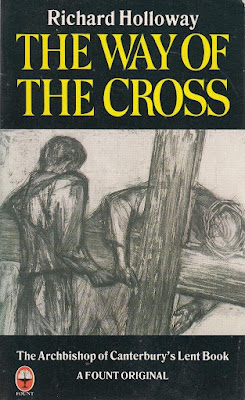A Brief Book Review: The Way of the Cross
Author: Richard Holloway, with a Foreword by the Archbishop of Canterbury, Robert Runcie
Publisher: Collins Fount Paperbacks, in association with Faith Press, 121 pages
The Author
The Rev. Richard Holloway, born in Glasgow, completed his theological studies in Edinburgh, London and New York. He was ordained a deacon in 1959, and a priest in 1960, serving two parishes in Glasgow until spending a sabbatical year (1967-8) at Union Theological Seminary in New York. His other pastorates included Old St. Paul’s, Edinburgh, the Church of the Advent, Boston, and Vicar of St. Mary Magdalen, Oxford. He also served as Bishop of Edinburgh, and was elected Primus of the Scottish Episcopal Church in 1992. In addition to this volume, he is the author of several other books.
Contents
This volume, in addition to 8 chapters, consists of Acknowledgements, Foreword by the Archbishop of Canterbury, a poem called Crux by Bob Bridges, and an Epilogue. With the exception of the first chapter, at the end of all the others there are questions for discussion.
Brief Observations
This wee volume contains meditations on seven of the fourteen traditional stations of the cross, combined with commentary on biblical texts and various literary citations, including: The Return of Arthur; The Last of the Just; Murder in the Cathedral and Four Quartets; The Mystery of Suffering; Too Late the Phalarope; The Ballad of Reading Gaol.
According to Holloway, the Passion of Jesus has a multitude of meanings, both reveals insightful truths, and transcends human explanations. The Passion contains revelation and mystery, as well as the presence of evil and holiness.
Some of the factors the author mentions in the trial and killing of Jesus are: envy, power and its abuse over against weakness and love, the fall and original sin, scapegoating the Jews, Jesus’s acceptance of and public association with women in contrast to the discrimination against women, the sin of self-deception.
Holloway, without naming them, reflects on the familiar views of atonement—endeavouring to understand and respond to them morally and theologically. He speaks of Jesus in front of us, for us and in us—bringing us forgiveness and new life.
The volume’s short epilogue is titled “Resurrection,” which ends with a citation from C.S. Lewis’s, The Last Battle.
This little work seems somewhat dated—published in 1986—and contains sexist language; and takes on the Passion that readers might argue about or disagree with.
For others, it may help them in their Lenten spiritual journey.
